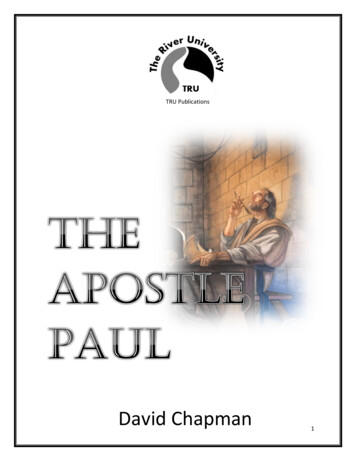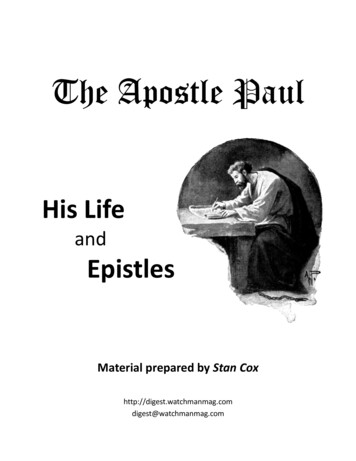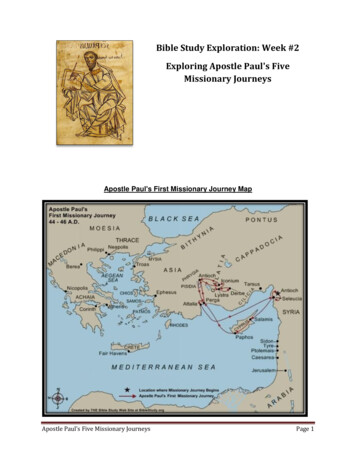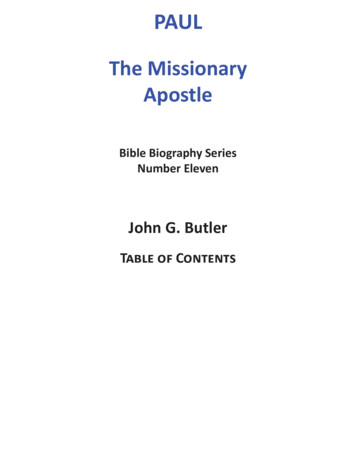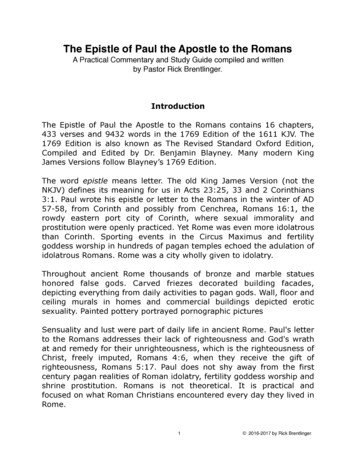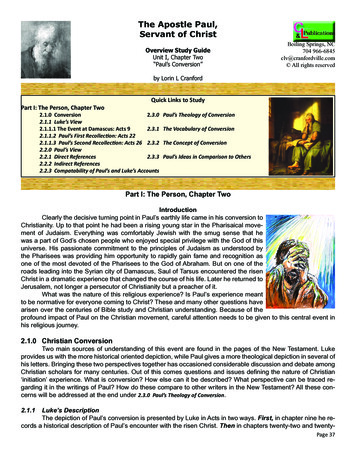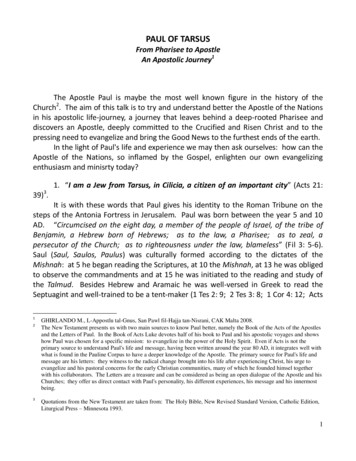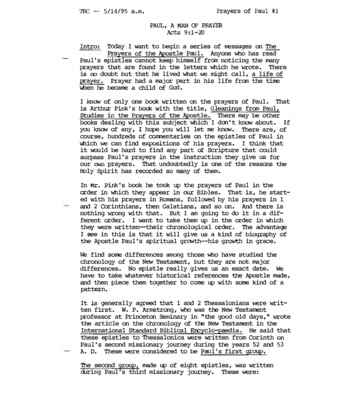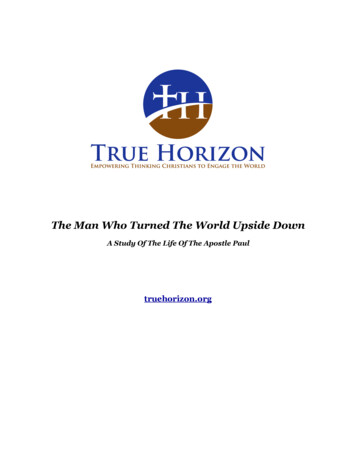
Transcription
The Apostle PaulHyperdispensationalismPDF generated using the open source mwlib toolkit. See http://code.pediapress.com/ for more information.PDF generated at: Tue, 19 Jul 2011 21:35:14 UTC
ContentsArticlesPaul the Apostle1Hyperdispensationalism19E. W. Bullinger23John Nelson Darby27Dispensationalist theology32Dispensationalism40The Way International50American Christian Press59Victor Paul Wierwille62Way Productions64The Way College of Biblical Research – Indiana Campus66Pauline Christianity67Marcion of Sinope72Marcionism75ReferencesArticle Sources and Contributors82Image Sources, Licenses and Contributors84Article LicensesLicense85
Paul the Apostle1Paul the ApostlePaul the ApostleAnanias of Damascus restores the sight of Saint Paul.A 1631 painting by Pietro Cortona.Apostle to the Gentiles[1]Bornca. AD 5Diedca. AD 67Honored inAll Christianity[2]in Tarsus, present-day Turkey [Acts 22:3][2]in RomeMajor shrine Basilica of Saint Paul Outside the WallsFeastJanuary 25 (The Conversion of Paul)February 10 (Feast of Saint Paul's Shipwreck in Malta)June 29 (Feast of Saints Peter and Paul)November 18 (Feast of the dedication of the basilicas of Saints Peter and Paul)AttributesswordPatronageMissions; Theologians; Gentile Christians;Paul the Apostle, also called the Apostle Paul, Saul of Tarsus, and Saint Paul (c. AD 5 – c. AD 67),[2] was one ofthe most influential early Christian missionaries, with his writings forming a considerable portion of the NewTestament. His influence on Christian thinking has been of utmost significance[3] due to his role as a prominentapostle of Christianity during the spreading of the Gospel through early Christian communities across the RomanEmpire.According to the Bible, Paul was known as Saul prior to his conversion, and was dedicated to the persecution of theearly disciples of Jesus in the area of Jerusalem.[4] While traveling from Jerusalem to Damascus on a mission to"bring them which were there bound unto Jerusalem", the resurrected Jesus appeared to him in a great light. Saul wasstruck blind, but after three days his sight was restored by Ananias of Damascus, and Paul began to preach that Jesusof Nazareth is the Jewish Messiah and the Son of God.[5]Along with Simon Peter and James the Just he was one of the most prominent early Christian leaders.[6] He was alsoa Roman citizen—a fact that afforded him a privileged legal status with respect to laws, property, and governance.[7][8]Fourteen epistles in the New Testament are attributed to Paul. His authorship of seven of the fourteen is questionedby modern scholars.[3] [9] Augustine of Hippo developed Paul's idea that salvation is based on faith and not "Worksof the Law".[3] Martin Luther's interpretation of Paul's writings heavily influenced Luther's doctrine of sola fide.Paul's conversion dramatically changed the course of his life. Through his missionary activity and writings heeventually transformed religious belief and philosophy around the Mediterranean Basin. His leadership, influence
Paul the Apostle2and legacy led to the formation of communities dominated by Gentile groups that worshiped the God of Israel,adhered to the Judaic "moral code", but relaxed or abandoned the "ritual" and dietary obligations of the Mosaic lawall on the basis of Paul's teachings of the life and works of Jesus Christ and his teaching of a new covenant (or "newtestament")[10] established through Jesus' death and resurrection. The Bible does not record Paul's death.SourcesThe main source for historical information about Paul's life is thematerial found in several of his epistles and the Book of Acts.However, these epistles contain comparatively little information aboutPaul's past. The Book of Acts also recounts Paul's career but leavesseveral parts of Paul's life out of its narrative, such as his (alleged)execution in Rome.[11] Scholars such as Hans Conzelmann and 20thcentury theologian John Knox (not to be confused with the 16thcentury John Knox) dispute the historical reliability of the Acts of theApostles.[12] [13] Paul's own account of his background is foundparticularly in Galatians. According to some scholars, the account inActs of Paul visiting Jerusalem[Acts 11:27-30] contradicts the account inPaul's letters.[11] (See the Acts of the Apostles article). Some scholarsconsider Paul's accounts to be more reliable than those found inActs.[14]Conversion of Saint Paul, a fresco byMichelangelo.NamesAlong with being ethnically Jewish, Paul was born a Roman citizen Acts 22:28. "Paul" was part of his three-partRoman name.[15] His given name was Saul (Hebrew: לּואָׁש , Modern Sha'ul Tiberian Šāʼûl ; "asked for, prayed for"),perhaps after the biblical King Saul, a fellow Benjaminite and the first king of Israel who was replaced by KingDavid, the second king of the united Kingdom of Israel.[16] In Ancient Greek: Σαούλ (Saul), Σαῦλος (Saulos), andΠαῦλος (Paulos), in Latin Paulus or Paullus, in Hebrew: יסרתה לואש Šaʾul HaTarsi (Saul of Tarsus)[17]When Jesus spoke to him prior to his conversion to Christianity on the Road to Damascus, Jesus called him "Saul" inconfronting him for persecuting the Christians: "Saul, Saul, why do you persecute me?”[Acts 9:4] Shortly thereafter, inaddressing a disciple named Ananias, Jesus referred to "a man from Tarsus named Saul."[Acts 9:4]The earliest biblical reference to his being called "Paul" is recorded in Acts 13:9: ".Saul, who was also calledPaul." All subsequent New Testament verses refer to him as "Paul" or with the appended title "Apostle Paul."Prior to conversionPaul, whose Hebrew name was Saul,[18] claimed to be "of the stock of Israel, of the tribe of Benjamin, a Hebrew ofthe Hebrews; as to the law, a Pharisee."[Phil. 3:5] Paul's "sister's son" is mentioned in Acts 23:16. Acts identifies Paulas from the Mediterranean city of Tarsus (in present-day south-central Turkey), well-known for its intellectualenvironment. Acts also quotes Paul indirectly referring to his father by saying he was "a Pharisee, the son of aPharisee".[Acts 23:6] Paul refers to his mother in Romans 16:13, among those at Rome. Paul confesses that "beyondmeasure" he persecuted the "church of God" prior to his conversion.[19] Paul was born a citizen of the city Tarsus aswell as a citizen of Rome, an honor not often granted to "outsiders." It is likely that Paul's family purchased theTarsian citizenship with money earned from their trade. His family were tent-makers, a trade that Paul uses tosupport himself throughout his ministry. Scripture does not say how Paul's family acquired a Roman citizenship butscholars speculate that his father or grandfather may have been honored with it for some sort of military service.[15]
Paul the Apostle3Although born in Tarsus, he was raised in Jerusalem "at the feet of Gamaliel",[20] who is considered to be "one of thegreatest teachers in all the annals of Judaism", and whose level headed advice to the council in Acts 5:34-39, to"refrain" from slaying the disciples, is in great contrast to the rashness of his student Saul, who went on a rampage,after the death of Stephen, persecuting the "saints".(Acts 9:13; Acts 26:10)Conversion and missionPaul's conversion can be dated to 31 – 36[21] [22] [23] by his reference toit in one of his letters.[11] According to the Acts of the Apostles, hisconversion (or metanoia) took place on the road to Damascus where heclaimed to have experienced a vision of the resurrected Jesus afterwhich he was temporarily blinded.[Acts 9:1-31] [22:1-22] [26:9-24]Post-conversion testimonyGeography relevant to Paul's life, stretching fromJerusalem to Rome.In the opening verses of Romans 1, Paul provides a litany of his ownapostolic claim and his post-conversion convictions about the risen Christ: Paul describes himself as a servant of Christ Jesus called to be an apostle set apart for the gospel of God Paul describes Jesus as having been promised by God "beforehand" through his prophets in the holy Scripturesbeing the Son of Godhaving biological lineage from David ("according to the flesh")[24]having been declared to be the Son of God in power according to the Spirit of holiness by his resurrection fromthe dead being Jesus Christ our Lord the One through whom we have received grace and apostleship to bring about the obedience of faith for thesake of his name among all the nations, "including you who are called to belong to Jesus Christ."Paul's writings give some insight into his thinking regarding his relationship with Judaism. He is strongly criticalboth theologically and empirically of claims of moral or lineal superiority [2:16-26] of Jews while conversely stronglysustaining the notion of a special place for the Children of Israel.[9-11]Paul asserted that he received the Gospel not from any person, but by a personal revelation of JesusChrist.[Gal 1:11-16] Paul claimed independence from the Jerusalem community[14] (possibly in the Cenacle), but wasjust as quick to claim agreement with it on the nature and content of the gospel.[Gal 1:22-24] What is remarkable aboutsuch a conversion is the changes in the thinking that had to take place. He had to change his concept of who themessiah was, particularly the absurdity of accepting a crucifed messiah. Perhaps more challenging was changing hisconception of the ethnic superiority of the Jewish people. There are debates as to whether Paul understood himself ascommissioned to take the gospel to the Gentiles at the moment of his conversion.[25]
Paul the Apostle4Early ministryAfter his conversion, Paul went to Damascus, where Acts states he washealed of his blindness and baptized by Ananias of Damascus.[26] Paulsays that it was in Damascus that he barely escaped death [2Cor. 11:32].Paul also says that he then went first to Arabia, and then came back toDamascus.[Gal. 1:17] Paul's trip to Arabia is not mentioned anywhereelse in the Bible, and some suppose he actually travelled to Mt. Sinaifor meditations in the desert.[27] [28] [29] He describes in Galatians howthree years after his conversion he went to Jerusalem. There he metJames and stayed with Simon Peter for 15 days.[Gal. 1:13-24]Paul asserted that he received the Gospel not from any person, but bythe revelation of Jesus Christ.[Gal. 1:11-12]. Paul claimed almost totalindependence from the Jerusalem community.[14] and yet appearedeager to bring material support from the various budding Gentilechurches that he planted to Jerusalem. In his writings, Paul persistentlyused the persecutions he claimed to have endured, in terms of physicalbeatings and verbal assaults, to claim proximity and union with Jesusand as a validation of his teaching.Paul's narrative in Galatians states that 14 years after his conversion hewent again to Jerusalem.[Gal. 2:1-10] It is not completely known whathappened during these so-called "unknown years," but both Acts andGalatians provide some partial details.[30] At the end of this time,Barnabas went to find Paul and brought him back to Antioch.The house believed to be of Ananias of Damascusin Damascus.Bab Kisan, believed to be where Paul escapedfrom persecution in Damascus.[Acts 11:26]When a famine occurred in Judea, around 45–46,[31] Paul and Barnabas journeyed to Jerusalem to deliver financialsupport from the Antioch community.[32] According to Acts, Antioch had become an alternative center for Christiansfollowing the dispersion of the believers after the death of Stephen. It was in Antioch that the followers of Jesus werefirst called "Christians."[Ac. 11:26]First missionary journeyThe author of the Acts arranges Paul's travels into three separate journeys. The first journey,[Acts 13-14] led initiallyby Barnabas,[33] takes Paul from Antioch to Cyprus then southern Asia Minor (Anatolia), and back to Antioch. InCyprus, Paul rebukes and blinds Elymas the magician[Ac 13:8-12] who was criticizing their teachings. From this pointon, Paul is described as the leader of the group.[34]They sail to Perga in Pamhylis. John Mark leaves them and returns to Jerusalem. Paul and Barnabas go on toPisidian Antioch. On the Sabbath they go to the Synagogue. The leaders invite them to speak. Paul reviews Israelitehistory from life in Egypt to King David. He introduces Jesus as a descendant of David brought to Israel by God. Hesaid that his team came to town to bring the message of salvation. He recounts the story of Jesus' death andresurrection. He quotes from the Hebrew scriptures to show that Jesus was the promised Messiah who brought themforgiveness for their sins. Both the Jews and the 'God-fearing' Gentiles invited them talk more the next Sabbath. Atthat time almost the whole city gathered. This upset some influential Jews who spoke against them. Paul used theoccasion to announce a change in his mission which from then on would be to the Gentiles. [Ac 13:13-48]Antioch served as a major Christian center for Paul's evangelizing.[35]
Paul the Apostle5Second missionary journeyPaul leaves for his second missionary journey from Jerusalem, in late Autumn 49,[36] where they were having acouncil with other apostles, and where the circumcision question was lifted up. On their trip around theMediterranean sea, Paul and his companion Barnabas stopped in Antioch where they had a sharp argument abouttaking John Mark with them on their trips. It is mentioned in the book of Acts that John Mark had left them in aprevious trip and went home; Paul did not think he was ready for this kind of evangelism. Paul and Barnabas decidedto separate. Barnabas ended up taking John Mark with him, while Silas joined Paul.Paul and Silas traveled to a lot of different cities such as Tarsus, Derbe and Lystra. In Lystra, they met Timothy, adisciple who was spoken well of, and decided to take him with them. The Church kept growing, adding believers,and strengthening their faith daily (Acts 16:5). In Philippi, men who were not happy about the conversion of theirslave turned the city against the missionaries and Paul and Silas were put in jail. After a miraculous earthquake, thegates of the prison fell apart and Paul and Silas were able to escape; this event led to the conversion of the jailor.They continued traveling, went by Berea and Athens where Paul preached to the Jews and Greeks; and in Corinthwhere Paul met Aquila and Priscilla who became faithful believers and helped Paul through his other missionaryjourneys. The couple followed Paul and his companions to Ephesus, and stayed there to start one of the strongest,and most faithful Church at that time. In 52, the missionaries sailed to Caeserea to greet the Church there, andtraveled down to Antioch to stay there for about 1 year before leaving again on their third missionary journey.[37]Third missionary journeyPaul began his third missionary journey by traveling allaround the region of Galatia and Phrygia to strengthen,teach and rebuke the believers. When he arrived inEphesus, he stayed there for a little less than 3 years andperformed a lot of miracles, like healing people andcasting demons out. Then he went through Macedonia,went up to Greece, and as he was getting ready to leavefor Syria, he changed his plans because of Jews who hadmade a plot against him, and had to go back throughMacedonia. He finished his trip in Caeserea.[40] [41]Journey to RomeSaint Paul delivering the Areopagus sermon in Athens, byRaphael, 1515. This sermon addressed early issues in[38] [39]Christology.Paul and his companions went on to Rome, which wasprobably their last missionary journey, in 60. They startedin Jerusalem where the brothers there received themjoyfully. Paul was beaten and almost killed before he was arrested and kept as a prisoner in Caesarea for about oneyear and a half even before starting his journey. He was transferred to Rome after his request and was released afterthe Roman commander realized that he was born a Roman citizen. Paul continued to preach in Rome and possiblytraveled to other countries like Spain and Britain before he died as a martyr in 68AD.[42]PersecutionMany plots were made against Paul in the last years of his life, especially by Jews who would stir the crowd andexcite them when Paul was preaching . He was beaten more than once, and put in prison. He was persecuted in everyone of his missionary journeys. He was persecuted because of a “lack of understanding, preconceptions, irritationsand provocation.”[43] The message of a risen Christ and Savior was aggravating for Jews as well as many paganbelievers. During his first missionary journey, Paul was stoned in the city of Lystra for healing a crippled man. Some
Paul the Apostle6Jews dragged him out of the city thinking he was dead but when his disciples came around him, he miraculously gotup and went into the city. Paul was also put in prison while he was in Philippi and also in Jerusalem.Council of JerusalemMost scholars agree that a vital meeting between Paul and theJerusalem church took place some time in the years 48 to 50,[11]described in Acts 15:2 and usually seen as the same event mentionedby Paul in Galatians 2:1.[11] The key question raised was whetherGentile converts needed to be circumcised.[44] At this meeting, Paulclaims in his letter to the Galatians that Peter, James, and Johnaccepted Paul's mission to the Gentiles. See also Circumcisioncontroversy in early Christianity.Jerusalem meetings are mentioned in Acts, in Paul's letters, and someappear in both.[45] For example, the Jerusalem visit for faminerelief[Acts 11:27-30] apparently corresponds to the "first visit" (to Cephasand James only).[Gal. 1:18-20][45] F. F. Bruce suggested that the"fourteen years" could be from Paul's conversion rather than the firstvisit to Jerusalem.[46]Incident at AntiochPaul on chapelDespite the agreement achieved at the Council of Jerusalem, asunderstood by Paul, Paul recounts how he later publicly confrontedPeter, also called the "Incident at Antioch" over Peter's reluctance to share a meal with Gentile Christians inAntioch.[47]Writing later of the incident, Paul recounts: "I opposed [Peter] to his face, because he was clearly in the wrong". Paulreports that he told Peter: "You are a Jew, yet you live like a Gentile and not like a Jew. How is it, then, that youforce Gentiles to follow Jewish customs?"[Gal. 2:11-14] Paul also mentions that even Barnabas (his travelingcompanion and fellow apostle until that time) sided with Peter.[48]The final outcome of the incident remains uncertain. The Catholic Encyclopedia [49] states: "Paul's account of theincident leaves no doubt that Peter saw the justice of the rebuke." In contrast, L. Michael White's From Jesus toChristianity claims: "The blowup with Peter was a total failure of political bravado, and Paul soon left Antioch aspersona non grata, never again to return."[50]The primary source for the Incident at Antioch is Paul's letter to the Galatians.Visits to Jerusalem in Acts and the epistlesThis table is adapted from White, From Jesus to Christianity.[45] Note that the matching of Paul's travels in the Actsand the travels in his Epistles is done for the reader's convenience and is not approved of by all scholars.
Paul the Apostle7Acts First visit to Jerusalem[Acts 9:26-27] There is debate over whether Paul's visit in Galatians 2 refers to the visit for famine relief (Acts11:30, 12:25) or the Jerusalem Council (Acts 15). If it refers to the former, then this was the tripmade "after an interval of fourteen years" (Gal. 2:1). Another [51]visit to Jerusalem[Gal. 2:1-10]14 years later (after Damascus conversion?)with Barnabas and Tituspossibly the "Council of Jerusalem"Paul agrees to "remember the poor"followed by confrontation with Peter and Barnabas in Antioch[Gal. 2:11-14] Apparently unmentioned. Anotherto "greet the church"Fifth visit to Jerusalem[Acts 21:17ff] three years after Damascus conversion[Gal. 1:17-18]sees only Cephas (Peter) and James with Barnabas"Council of Jerusalem"followed by confrontation withBarnabas in Antioch[Acts 15:36-40]Fourth visit to Jerusalem[Acts 18:21-22]First visit to Jerusalem[Gal. 1:18-20] for famine reliefThird visit to Jerusalem[Acts 15:1-19] "after many days" of Damascusconversionpreaches openly in Jerusalem withBarnabasmeets apostlesSecond visit toJerusalem[Acts 11:29-30],[Acts 12:25] Epistlesafter an absence of severalyears[Acts 24:17]to bring gifts for the poor and topresent offeringsPaul arrested [52][53]visit to Jerusalemto deliver the collection for the poorResumed missionAround 50–52, Paul spent 18 months in Corinth.[11] The reference in Acts to proconsul Gallio helps ascertain thisdate (cf. Gallio inscription).[11] Here he worked with Silas and Timothy.[11]After Corinth, the next major center for Paul's activities was Ephesus.[11] Ephesus was an important center for earlyChristianity from the year 50, see also Early centers of Christianity#Western Anatolia. From 52 to 54, Paul livedhere, working with the congregation and apparently organizing missionary activity into the hinterlands.[54] Paul'stime here was marked by disturbances and possibly imprisonment. Finally, he was forced to leave.[11]Next, he traveled to Macedonia[55] before going probably to Corinth for three months (56–57) before his final visit toJerusalem.[11] Though Paul wrote that he visited Illyricum, he meant what would now be called Illyria Graeca[56]that was part of the Roman province of Macedonia, which is now modern day Albania.[57]
Paul the Apostle8Arrest and deathPaul arrived in Jerusalem in 57 with a collection of money for thecommunity there.[11] Acts reports that he was warmly received. ButActs goes on to recount how he was interrogated by James for'teaching all the Jews living among the gentiles to forsake Moses, andthat you tell them not to circumcise their children or observe thecustoms'.(Acts 21, 21) Paul underwent a purification ritual in order togive the Jews no grounds to bring accusations against him for notfollowing their law. Paul however continued to preach againstcircumcision, Jewish dietary restrictions, and other requirements of theTorah. This made a final rift inevitable with the Jews. [11] Paul causeda stir when he appeared at the Temple, and he escaped being killed bythe crowd by being taken into custody.[11] He was held as a prisonerfor two years in Caesarea until a new governor reopened his case in59.[11] When accused of treason, he appealed to Caesar, claiming hisright as a citizen of Rome to appear there before a proper court and todefend himself of the charges.[11]Saint Paul arrested, early 1900s Bible illustration.Acts recounts that on the way to Rome Paul was shipwrecked on"Melite" (Malta),[11] [Acts 28:1] where he was met by Publius[Acts 28:7]and the islanders, who showed him "unusual kindness".[Acts 28:2] Hearrived in Rome c 60 and spent two years under house arrest.[11][Acts 28:16]All told, during his ministry the Apostle Paul spent roughly5½ to 6 years as a prisoner or in prison.Irenaeus of Lyons in the 2nd century believed that Peter and Paul hadSaint Paul's beheading. Painting by EnriqueSimonet in 1887.been the founders of the Church in Rome and had appointed Linus as[58]succeeding bishop.Paul was not a bishop of Rome nor did he bringChristianity to Rome since there were already Christians in Rome when he arrived there (Acts 28:14-15). Also Paulwrote his letter to the church at Rome before he had visited Rome (Romans 1:1,7,11-13; 15:23-29). However, Paulwould have played an important role in the life of the early church at Rome.Neither the Bible nor other history says how or when Paul died. According to Christian tradition, Paul was beheadedin Rome during the reign of Nero around the mid-60s at Tre Fontane Abbey (English: Three Fountains Abbey).[59]By comparison, tradition has Peter being crucified upside-down. Paul's Roman citizenship accorded him the moremerciful death by beheading.[60]In June 2009, Pope Benedict announced excavation results concerning the tomb of Paul at the Basilica of Saint PaulOutside the Walls. The sarcophagus itself was not opened but was examined by means of a probe. It revealed piecesof incense and purple and blue linen as well as small bone fragments. The bone was radiocarbon dated to the 1st to2nd century. According to the Vatican, this seemed to confirm the tradition of the tomb being Paul's.[61]WritingsFourteen epistles in the New Testament are attributed to Paul, of which seven are almost universally accepted, andseven are disputed, (Ephesians, Colossians, 2nd Thessalonians, 1st Timothy, 2nd Timothy and, Titus, and Hebrews),of which four are considered in some academic circles as other than Pauline for textual and grammatical reasons, andthe other three are in dispute in those same circles.[62] Paul apparently dictated all his epistles (except Galatians)through a secretary (or amanuensis), who would usually paraphrase the gist of his message, as was the practiceamong 1st-century scribes.[62] [63] These epistles were circulated within the Christian community, where they were
Paul the Apostleread aloud by members of the church along with other works. Paul's epistles were accepted early as scripture andlater established as Canon of Scripture. Critical scholars regard Paul's epistles (written 50–62) to be [among] theearliest-written books of the New Testament. They are referenced as early as c. 96 by Clement of Rome.[64]AuthorshipPaul's letters are largely written to churches which he had visited; hewas a great traveler, visiting Cyprus, Asia Minor (modern Turkey),mainland Greece, Crete, and Rome. His letters are full of expositionsof what Christians should believe and how they should live. He doesnot tell his correspondents (or the modern reader) much about the lifeof Jesus; his most explicit references are to the Last Supper[1 Cor.11:17-34]and the crucifixion and resurrection.[1 Cor. 15] His specificreferences to Jesus' teaching are likewise sparse,[1 Cor. 7:10-11] [9:14]raising the question, still disputed, as to how consistent his account ofPaul Writing His Epistles, 16th century (Blafferthe faith is with that of the four canonical Gospels, Acts, and theFoundation Collection, Houston, Texas).Epistle of James. The view that Paul's Christ is very different from thehistorical Jesus has been expounded by Adolf Harnack among manyothers. Nevertheless, he provides the first written account of what it is to be a Christian and thus of Christianspirituality.Of the fourteen letters attributed to Paul and included in the Western New Testament canon, there is little or nodispute that Paul actually wrote at least seven, those being Romans, First Corinthians, Second Corinthians, Galatians,Philippians, First Thessalonians, and Philemon. Hebrews (no relation to the Gospel according to the Hebrews),which was ascribed to him in antiquity, was questioned even then, never having an ancient attribution, and in moderntimes is considered by most experts as not by Paul (see also Antilegomena). The authorship of the remaining sixPauline epistles is disputed to varying degrees.The authenticity of Colossians has been questioned[65] on the grounds that it contains an otherwise unparalleleddescription (among his writings) of Jesus as 'the image of the invisible God,' a Christology found elsewhere only inJohn's gospel. On the other hand, the personal notes in the letter connect it to Philemon, unquestionably the work ofPaul. Internal evidence shows close connection with Philippians.[66] Ephesians is a very similar letter to Colossians,but is almost entirely lacking in personal reminiscences. Its style is unique. It lacks the emphasis on the cross to befound in other Pauline writings, reference to the Second Coming is missing, and Christian marriage is exalted in away which contrasts with the reference in 1 Cor. 7:8-9. Finally, according to R.E. Brown, it exalts the Church in away suggestive of a second generation of Christians, 'built upon the foundation of the apostles and prophets' nowpast.[67] The defenders of its Pauline authorship argue that it was intended to be read by a number of differentchurches and that it marks the final stage of the development of Paul of Tarsus's thinking. It has to be noted, too, thatthe moral portion of the Epistle, consisting of the last two chapters has the closest affinity with similar portions ofother Epistles, while the whole admirably fits in with the known details of St. Paul's life, and throws considerablelight upon them.[66]9
Paul the Apostle10The Pastoral Epistles, 1 and 2 Timothy, and Titus have likewise been put inquestion as Pauline works. Three main reasons are advanced: first, theirdifference in vocabulary, style, and theology from Paul's acknowledgedwritings; Defenders of the authenticity note, that they were then probablywritten in the name and with the authority of the Apostle by one of hiscompanions, to whom he distinctly explained what had to be written, or towhom he gave a written summary of the points to be developed, and thatwhen the letters were finished, St. Paul read them through, approved them,and signed them.[66] Secondly, the difficulty in fitting them into Paul'sbiography as we have it.[68] They, like Colossians and Ephesians, werewritten from prison but suppose Paul's release and travel thereafter.However, Christianity was not yet declared a religio illicita at the time theywere written, and according to Roman law there was nothing deserving ofdeath against him.[66] Finally, the concerns expressed are very much thepractical ones as to how a church should function. They are more aboutmaintenance than about mission.2 Thessalonians, like Colossians, is questioned on stylistic grounds, withsome noting, among other peculiarities, a dependence on 1 Thessaloniansyet a distinctiveness in language from the Pauline corpus. This, again, isexplainable by the possibility of St. Paul requesting one of his companionsto write the letter for him under his instructions.[66]AtonementRussian Orthodox icon of the Apostle Pa
Paul the Apostle, also called the Apostle Paul, Saul of Tarsus, and Saint Paul (c. AD 5 – c. AD 67),[2] was one of the most influential early Christian missionaries, with his writings forming a considerable portion of the New Testament. His influence on Christian thinking has been
